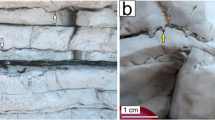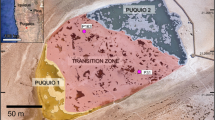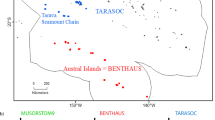Abstract
THE origin of fine carbonate muds in deep parts of the Black Sea has been explained in various ways, but details of how the carbonate was formed are poorly understood. We have studied samples containing fine carbonate from cores obtained during the cruise of Atlantis II (Woods Hole Oceanographic Institute) to the Black Sea in April and May 1969. Examination of the light-coloured bands and darker bands by scanning electron micrographs and light microscopy shows that Holocene coccoliths are the overwhelmingly dominant constituents in the light bands, whereas Cretaceous and Eocene coccoliths are important components of the carbonate in the darker matrix.
This is a preview of subscription content, access via your institution
Access options
Subscribe to this journal
Receive 51 print issues and online access
$199.00 per year
only $3.90 per issue
Buy this article
- Purchase on Springer Link
- Instant access to full article PDF
Prices may be subject to local taxes which are calculated during checkout
Similar content being viewed by others
References
Andrusov, N. I., Izvesitya Russk. Geog. Obshchestva, 26, 398 (1890).
Murray, J., Scottish Geog. Mag., 16, 673 (1900).
Strakhov, N. M., Izvestiya Akad. Nauk, SSSR, Ser. Geol., 22, 49 (1947).
Arkhangel'skii, A. D., Byull. Moskov. Obshchestva Ispytateley Prirody, Otdel Geol., 5, 199 (1927).
Arkhangel'skii, A. D., and Strakhov, N. M., Byull. Moskov. Obschestva Ispytateley Prirody, Otdel Geol., 10, 3 (1932).
Arkhangel'skii, A. D., and Strakhov, N. M., Geologicheskoye stroeniye i istoriya razvitiya Chernogo morya (Izdat. Akad. Nauk SSR, Moscow–Leningrad, 1938).
Strakhov, N. M., Trudy Inst. Geol. Akad. Nauk, SSR, 124, 184 (1951).
Strakhov, N. M., in Obrazovaniye Osadkov v Sovremennykh vodoyemakh (edit. by Bezrukov, P. L.), 81 (Izdat. Akad. Nauk, SSSR, Moscow, 1954).
Usachev, P. I., Uspekhi sovr. biol., 23, 265 (1947).
Morozova-Vodyanitskya, N. V., Trudy Sevastopol. Biol. St., 6, 39 (1948).
Morozova-Vodyanitskaya, N. V., Trudy Sevastopol. Biol. St., 8, 11 (1954).
Morozova-Vodyanitskaya, N. V., and Belogorskaya, E. V., Trudy Sevastopol. Biol. St., 9, 14 (1957).
Belogorskaya, E. V., Trudy Sevastopol. Biol. St., 12, 71 (1959).
Mikhailova, N. F., Trudy Sevastopol. Biol. St., 15, 50 (1964).
Schiller, J., Arch. Protistenk., 51, 1 (1925).
Lanskaya, L. A., in Osnovnye cherty geologicheskogo stroyeniya gidrologicheskogo rezhima i biologii Stredizemnogo morya (edit. by Fomin, L. M.), 165 (Izdar. “Nauka”, Moscow, 1965).
Mjaaland, G., Oikos, 7, 251 (1956).
Pitsyk, G. K., Trudy Sevastopol. Biol. St., 16, 71 (1963).
Vinogradov, A. P., Grimenko, V. A., and Ustinov, V. I., Geokhimiya, 10 (1962).
Author information
Authors and Affiliations
Rights and permissions
About this article
Cite this article
BUKRY, D., KING, S., HORN, M. et al. Geological Significance of Coccoliths in Fine-grained Carbonate Bands of Postglacial Black Sea Sediments. Nature 226, 156–158 (1970). https://doi.org/10.1038/226156a0
Received:
Revised:
Issue Date:
DOI: https://doi.org/10.1038/226156a0
Comments
By submitting a comment you agree to abide by our Terms and Community Guidelines. If you find something abusive or that does not comply with our terms or guidelines please flag it as inappropriate.



